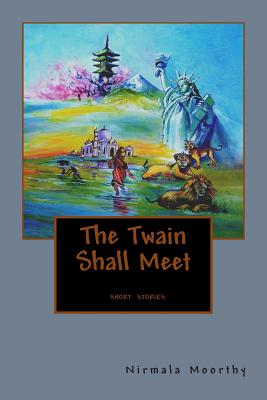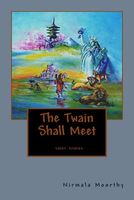- Welcome to FictionDB, Guest
- | My Account
- | Help

The Twain Shall Meet — Nirmala Moorthy
The Twain Shall Meet is a collection of stories dealing with cross-cultural interaction. They are stories of love and betrayal, of sacrifice and revenge, of hope and despair, of brutality and forgiveness, enacted by a colorful cast of characters drawn from all walks of life- professors, doctors, business executives, tribal chiefs, village astrologers, bandits, magicians, housewives, fashion models, cooks, housemaids, eccentric uncles, one-eyed waiters, and octogenarian aunts. The Pasadena Weekly, Los Angeles, had this to say about Moorthy's choice of protagonists for her books: "Chillingly aware of the towering walls of tradition and societal repression that keep closing in with every passing year," Moorthy's protagonist is usually "a shrewd observer, a social commentator, and an innocent, undemanding protagonist who excites and holds the reader's sympathy." The Twain Shall Meet highlights the comic side of humanity, the inability of the average person to see himself as he truly is. He goes through life in a state of total unawareness. Until a situation arises that holds up a mirror that reflects himself- a pattern in most of the stories in this book. More often than not, the result is comic rather than tragic. Moorthy's understated humor is very much in evidence in this book. Serious misunderstandings between people who come together from the ends of the earth can cause hatred and bloodshed. Moorthy asks for "much laughter, a few tears, and no bloodshed" from her readers. The characters in The Twain Shall Meet are hard to forget. According to India's newspaper "The Asian Age"- Moorthy's characters are always "down-to-earth and identifiable. Her writing entices you right from the very onset and stays long after the last page is turned." The problems facing the protagonist in The Twain Shall Meet are never the same: Is it safe to give someone a gift in Japan? Why do happily married couples check into a Tokyo love-motel? Where can you get the world's strangest coffee? What is Hongkong's cure for people who will not eat their vegetables? Where in India do you turn for help in finding the love of your life? Is there really any hope for the dead? When gangsters armed with machine guns invade your house in West Africa, what do you say to them? How difficult is it to find alternate technology in oil-rich Nigeria? Where do you look for people who have vanished without a trace? How do you entertain a conservative old aunt in New York? Are miracles possible in Los Angeles? How do you establish rules of behavior for garden and household predators? "Moorthy delves readily into forgotten rituals and traditions close to an armchair anthropologist's heart. Some of it might seem like the nostalgic meanderings of an exile who misses the homeland, but it explains why her first novel, "Maya" has been used as reference material for courses on Asian women in some Southern California universities."-The Pasadena Weekly, Los Angeles Moorthy takes the reader from one end of the world to the other on a kaleidoscopic tour of people, places, and unexpected happenings. Her fiction has been described as "fast-paced and difficult to put down." The reader barely has time to catch his breath after reading one story before he's thrust head-first into another strange land, another language barrier, and another set of traditions that take him by surprise. The twists, turns, and revelations in each intricate plot come fast and hard, and frequently land the protagonist in danger. Moorthy has been recognized for her fast pacing and chilling foreshadowing, and the sudden concluding twist that can land like a punch in the gut. Which might have been one reason why her novel The River Turned Red was number one on the list of Ten Favorite Fiction Picks for 2003 selected by the Pasadena Weekly, Los Angeles? "Moorthy's writing jumps off the page and grabs you."--Phyllis Gebauer, UCLA's Outstanding Teacher in Creative Writing.
Genres
Click on any of the links above to see more books like this one.

